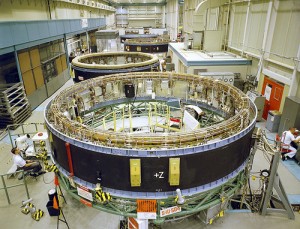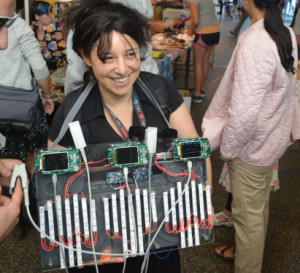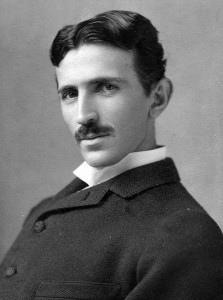Podcast: Play in new window | Download
Subscribe: Apple Podcasts |
 In this episode we talk about product development with electrical engineer Dave Young, who is an author, educator, and small business owner.
In this episode we talk about product development with electrical engineer Dave Young, who is an author, educator, and small business owner.
- Brian has been fortunate enough to be involved in new product development for much of his career.
- Many firms try to avoid a technology push, in which a novel technology is introduced to the market. However, some authors claim that technology push can be a winning market strategy.
- An alternate marketing approach, known as “market pull” or “product pull,” is to wait for consumers to request a particular product and allow that demand to “pull” the product into the marketplace.
- Our guest is Dave Young, who previously joined us on The Engineering Commons for an episode about STEM Education.
- Dave’s interest in engineering deepened as he tinkered with “X10” home automation modules as a teenager.
- We learn from Dave why it is always important to turn off one’s soldering iron when suspending work for the evening.
- Carmen and Dave share a common view on writing code; they would prefer if someone else was doing it!
- Dave is a co-founder of Blue Stamp Engineering, a summer program which encourages high school students to build projects about which they are truly passionate. Programs are currently active in New York, Houston, San Fransisco and Denver.
- Our guest is also a frequent contributor of articles to the electronics community known as Element 14.
- In addition to articles about entrepreneurship, Dave likes to write about Cadsoft Eagle, an electronic design automation program.
- According to Dave, element 14 is the place to go to ask questions about the credit card-sized computer board known as Raspberry Pi.
- First-time engineering entrepreneurs often fall into the trap of believing that building a “better mousetrap” will automatically lead to economic success.
- The term complex sales refers to the process of dealing with the many requirements of selling to a large enterprise.
- Dave has been running his consulting business, Young Circuit Designs, since 2010.
- To get product development started, Dave enjoys sitting down with a client and having a “fun conversation,” in which all manner of product ideas are considered, without regard to practicality.
- Dave will return to the client with a “menu” of between 2 and 10 product concepts that he thinks merit further consideration.
- It’s hard to guess which ideas will take off in the marketplace; Dave says he would have never guessed that the Snuggie would become a great success.
- Clients of our guest’s consultancy are located across the United States, and have come from as far away as Nairobi.
- In Dave’s work, the intellectual property (IP) typically belongs to the client.
- One of Dave’s clients is BrewJacket, the company bringing the Kickstarter-funded Lager Jacket product to market for home-brewers who can’t keep their lagers cool enough during the fermentation process.
- The Peltier effect can be used to move heat across an electrified junction of two dissimilar conductors.
- Carmen expresses his concern over worts being put to waste while testing the Lager Jacket product.
- Dave has developed a double-kettle brewing system where he and a friend can boil worts at the same time.
- Carmen is thinking about one day entering a beer recipe in an annual contest held by the Raleigh Brewing Company.
- Dave recently posted an article about making custom Arduino boards.
- Our guest’s advice: “Always do awesome stuff!”
- Dave can be reached on the web at Blue Stamp Engineering and Young Circuit Designs. He posts on Twitter as @DaveYoungEE and @BlueStampEng. Additionally, there is a Facebook page for Blue Stamp Engineering.
Thanks to NASA’s Marshall Space Flight Center for the photo titled “Manufacturing the Saturn V Instrument Unit (Archive: NASA, Marshall).” Podcast theme music provided by Paul Stevenson.
Podcast: Play in new window | Download
Subscribe: Apple Podcasts |
 Guest Sophi Kravitz helps us understand some of the issues involved with starting a one-person consulting firm.
Guest Sophi Kravitz helps us understand some of the issues involved with starting a one-person consulting firm.
- Jeff started out on his own in 1994, but had a rocky beginning before landing on his feet.
- Carmen fears that, left to his own devices, he would spend his days watching Seinfeld reruns.
- Our guest, Sophi Kravitz, runs her own business at MIX-E, LLC, where she consults in electrical engineering and product market analysis.
- One of Sophi’s projects was recently featured on Hack A Day.
- Both Carmen and Sophi contributed articles to the Engineer Blogs website a few years back.
- Sophi’s has a blog at SuperGreenDot.com, where she interviews people who have successfully left the corporate life to head out on their own.
- She also has a work site blog, where she talks about projects she is working on and conferences she has attended.
- Our guest became frustrated working on projects she wasn’t passionate about, so she struck out on her own in 2012.
- Before jumping out on her own, Sophi spent two years in a sales engineering job that allowed her to earn some decent money while working three days a week.
- A freelancer is someone who is not committed to a particular employer on a long-term basis.
- While scoping out the consulting business, Sophi looked for short-term engineering gigs on craigslist. She found few opportunities that were worth her while.
- Sophi shows a great deal of compassion in listening to the ideas of others, despite having been pitched on a few “perpetual motion” machines.
- Because she lost money each time she entered a “fixed cost” bid, our guest now charges on an hourly basis.
- Jeff suggests breaking projects into smaller phases when possible; Sophi notes that she is now asking for money to perform an initial “research” phase on larger projects.
- Sophi splits her time between working at clients’ sites, and working out of her own “lab.”
- When she’s looking for technical support, Sophi often relies on the Toymakers IRC.
- It’s important to keep current on tools and techniques, and to maintain industry contacts, even while engaged in a long-term consulting job.
- Although she prefers designing electronic circuits, Sophi is often hired to power up industrial machinery or write PLC (programmable logic controller) programs.
- While Sophi and Jeff wonder if there is any money to be made bidding on jobs through websites like Elance and Guru, other engineers have found ways to earn a living through online contracts.
- Our guest notes a website, FlexJobs, that seeks to match job-seekers with part-time and freelance gigs.
- When trying to determine how much to charge for her consulting services, Sophi turned to advice from Dave Young (prior guest on this podcast) and electronics hobbyist Ben Heckendorn.
- Jeff suggests that most consultants can bill for only about 1,000 hour annually. So if you want $80K in income, charge $80 per hour. Remember, however, you need to cover expenses out of that amount. So you may need to charge $100 per hour if you wish to maintain an income that is equivalent to a full-time job paying $80K in salary.
- From the interviews she conducted on her Super Green Dot blog, Sophi was surprised to learn how many people struck out on their own without an emergency fund in place.
- Jeff notes that employer-paid healthcare in the US results largely because of IRS tax rulings in the 1940s allowing companies to offer increased healthcare benefits even though wages were frozen due to the economic hardships of World War II.
- Sophi see engineering work moving slowly towards the freelance model, although she believes companies will always need to retain a certain number of engineers who understand the firm’s underlying technology.
- Electrical engineers Brian, Carmen, and Sophi start musing about electronics design software… and your humble scribe, a mechanical engineer, started to zone out. Something about products from Cadence, Mentor, and Altium were mentioned… I think. If you’re interested, you’ll just have to listen for yourself!
- It’s our guest’s opinion that gaining experience is more important than making money early in one’s career.
- Jeff reports participating in a recent Big Beacon twitter chat, and leading a discussion about “why engineers should adopt an artistic mindset.” Since Sophi started as a sculptor, she is able to make an accurate comparison between the work of an engineer, and that of an artist.
- Sophi’s largest sculpture was a 10 foot diameter fake birthday cake she created in 1998. It was displayed in the gusty winds of Fire Island the following year.
- Attending a conference in California, Jeff is urged by his roommate to wrap up the podcast so that they can go fetch an In-N-Out burger. (It was quite good!) Carmen started rattling off items from the not-so-secret In-N-Out “secret menu.”
- You can reach Sophi through her website, or follow her on Twitter.
Thanks to Sophi Kravitz for allowing us to use the photo of her and her HeartBeat Boombox as the image for this episode. Podcast theme music provided by Paul Stevenson
Podcast: Play in new window | Download
Subscribe: Apple Podcasts |
 Guest David E. Goldberg talks with us about shifting expectations for engineers, and reveals the crucial skills needed by tomorrow’s engineering professionals.
Guest David E. Goldberg talks with us about shifting expectations for engineers, and reveals the crucial skills needed by tomorrow’s engineering professionals.
- Listening and questioning are important skills for today’s engineer, but these subjects are rarely addressed in the engineering curriculum.
- Our guest is David E. Goldberg, who is the Jerry S. Dobrovolny Distinguished Professor Emeritus at University of Illinois at Urbana-Champaign (UIUC), and the CEO of ThreeJoy Associates.
- Dave obtained an amateur radio license as a teenager, allowing him to communicate around the world via a Model 15 teletype machine.
- A day spent shadowing a city engineer led Dave to enroll in civil engineering.
- Despite his background in civil engineering, our guest wrote one of the leading references about genetic algorithms. His interest in artificial intelligence was sparked by the book, Gödel, Escher, Bach: An Eternal Golden Braid.
- In 2010, Dr. Goldberg resigned his tenure at UICU, and undertook training as a leadership coach at Georgetown University.
- Dave’s efforts with engineering reform started with iFoundry at UIUC. This project was influenced by the National Academy of Engineering report, The Engineer of 2020. Another influential report was Engineering for a Changing World, authored by James J. Duderstadt of the University of Michigan.
- Making changes to the engineering curriculum is difficult, as it induces a log-rolling problem among the faculty.
- In the late 1800’s, leading electrical engineers enjoyed a “rock star” status. This included luminaries such as Thomas Edison, George Westinghouse, and Nikola Tesla.
- It has been argued that technology and innovation are dominated by market-driven value judgments, rather than technical knowledge. This leads to engineering being a socially captive profession.
- The rise and fall of engineers as business leaders may have resulted as a conflict between bureaucratic loyalty and professional independence, as outlined in The Revolt of the Engineers, a book by Edwin Layton.
- Dave discusses the myth that science won World War II. Manufacturing engineers helped US factories and shipyards crank out planes, ships, and other war materiel, equaling the contributions of physicists.
- After the war, “physics envy” caused changes in the engineering curriculum, as advised by the Grinter Report, issued in 1955.
- While the pre-WWII engineering curriculum covered math and science at a fundamental level, the number of “hands-on” classes (drafting, shop, design, etc.) were far more prevalent than they are today.
- Looking forward, innovation seems to be a crucial skill for engineers, as suggested by the following books:
- When it comes to deciding whether software engineers are really “engineers,” Michael Davis of Illinois Institute of Technology (IIT) points to the lack of a accredited engineering degree as a reason for disqualifying programmers from claiming “engineering” status. Our guest makes no such distinction.
- Engineers need to move from being category “enhancers” to being category “creators.” Dr. Goldberg claims the primary difference between these functions is emotional, and not technical.
- Whereas engineers of the past needed to be obedient in enhancing marketplace offerings, tomorrow’s engineers must be courageous in “unleashing” their creative talents to invent novel products and services.
- Dave believes that engineering faculty must shift from an attitude of “I know” to “I trust” to successfully foster valiant young engineers.
- In his consulting work with ThreeJoy Associates, our guest works to transform the organizational, cultural, and emotional norms of institutions committed to engineering education.
- Big Beacon is a “social movement of the willing” formed to share best practices in reforming educational institutions. The project’s Twitter handle is @BigBeacon, and it has a Facebook page, as well.
- Slated for release in early 2014, Dave and co-author Mark Somerville are working on a new book, titled “A Whole New Engineer: A Surprising Emotional Journey.”
- Programs such as First Robotics and Project Lead the Way are having success in encouraging students to pursue engineering degrees.
- Unfortunately, students entering the engineering program are subjected to an math-science death march. Alternative rites of passage may be available for aspiring engineers.
- Coaching and collaborative skills may be useful for engineers who have completed a traditional engineering education. Google offers its employees a course on mindfullness.
- Dave can be reached by email as “deg” at “threejoy.com.” His Twitter handle is @deg511. He can be found on Facebook as deg511.
Thanks to Wikipedia Commons for the photograph of Nikola Tesla. Podcast theme music provided by Paul Stevenson
Practical insights for the engineering crowd
 In this episode we talk about product development with electrical engineer Dave Young, who is an author, educator, and small business owner.
In this episode we talk about product development with electrical engineer Dave Young, who is an author, educator, and small business owner.
